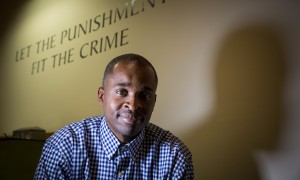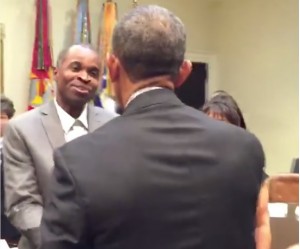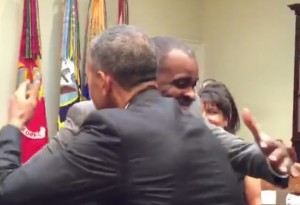 In 1993, Norman Brown was told he would die behind bars.
In 1993, Norman Brown was told he would die behind bars.
In 2015, Brown walked free after being granted clemency by President Barack Obama. Norman Brown is not a super-predator. He is a grateful, enthusiastic hard-working man who spent over two decades of his life behind bars. He is a man whose mother, father and grandmother all passed during his incarceration. He is a man who left behind an infant daughter when he was locked up. He is a man dedicated to reach back and help those left behind, equally deserving of clemency, and equally deserving of the benefit in a change in the laws that that allow people to be warehoused without a second look. Norman Brown and six others were blessed to meet and lunch with President Obama in March. One of the things he and the others stressed was that they were not unique, but representative of thousands of others who likewise deserve a second chance. Welcome home Norman. Welcome home all clemency recipients. Read & Listen to Norman’s story.
- The White House publishes an August 2016 video about Norman Brown, and what he’s learned after serving 20 years, receiving clemency
- Norman Brown feature “Life After Prison,” via White House Medium.com, May 5, 2016
- Man Granted Clemency Describes Life in the US Prison System, March 31, 2016 The Guardian
- Norman Brown was Supposed to Die in Prison. Instead He’s Pushing Obama to Help Those He Left Behind “Allow the time to fit the crime,” says Brown, Huffington Post, April 9, 2016
- A Second Chance in Life, Baltimore Sun, July 24, 2015
- Formerly Incarcerated Advocate Norman Brown Tells Obama to Step Up Commutations on TV One’s News One Now, Chicago Defender, March 31, 2016
- What it’s like to get lunch with the president who gave you your freedom, Fusion, April 1, 2016
View Mr. Brown and other commutees getting a surprise visit from President Obama on the very day he commuted the sentences of 61 people on March 30, 2016.


Norman Brown and other clemency recipients speak at Justice Roundtable just prior to White House “Life After Clemency” event. 

As of August 3, 2016, President Obama has commuted the sentences of 562 people.
“With 562 total commutations during his presidency — most of which have come in the past year —Obama has now used his constitutional clemency power to shorten the sentences of more federal inmates than any president since Calvin Coolidge.” (USA Today)
President Obama Has Now Commuted the Sentences of 248 Individuals
(update – as of May 5, 2016, President Obama has commuted 306 people)
As of May 5, 2016, the President has commuted the sentences of 306 individuals– more than the previous six Presidents combined, not including the Ford-era Clemency Board commutations. See White House video featuring the May 5th commutations, featuring commentary from Norman Brown & others who lunched with President Obama.
Please check out the video on Facebook of the President greeting a room full of folks on March 30 at the White House whose sentences have been commuted over the past couple decades. Following the meeting the President and group had lunch at Busboys and Poets in DC.
MARCH 30, 2016 AT 11:01 AM ET BY NEIL EGGLESTON, White House Counsel
Summary: Underscoring his commitment to reforming our criminal justice system, President Obama will meet with past commutation recipients to discuss the reentry process.
Underscoring his commitment not just to clemency, but to helping those who earn their freedom make the most of their second chance, the President will meet today with commutation recipients from both his Administration and the previous administrations of Presidents George W. Bush and Bill Clinton. During the meeting, the commutation recipients will discuss their firsthand experiences with the reentry process and ways that the process can be strengthened to give every individual the resources he or she needs to transition from prison and lead a fulfilling, productive life. Building on this conversation, tomorrow the White House will host a briefing titled Life After Clemency with advocates, academics, and Administration officials to discuss and share ideas on the President’s clemency initiative and ways to improve paths to reentry. In addition to officials from the White House and the Department of Justice, experts, academics, and commutation recipients will share their expertise and insights on returning to society after years behind bars. Throughout the remainder of his time in office, the President is committed to continuing to issue more grants of clemency as well as to strengthening rehabilitation programs. As he wrote in a letter to the 61 individuals receiving clemency today:
“The power to grant pardons and commutations… embodies the basic belief in our democracy that people deserve a second chance after having made a mistake in their lives that led to a conviction under our laws.”
And, he cautioned those receiving clemency that what they do with this unexpected opportunity reflects not only on each individual person, but also on all those still behind bars who are seeking that same shot at a new life. Despite the progress we have made, it is important to remember that clemency is nearly always a tool of last resort that can help specific individuals, but does nothing to make our criminal justice system on the whole more fair and just. Clemency of individual cases alone cannot fix decades of overly punitive sentencing policies. So while we continue to work to resolve as many clemency applications as possible – and make no mistake, we are working hard at this – only broader criminal justice reform can truly bring justice to the many thousands of people behind bars serving unduly harsh and outdated sentences. Fortunately, we are at a unique moment in history where such reform is possible. For the first time in a quarter century, Americans across the board acknowledge that the criminal justice system is broken and needs to change. This is no longer a partisan issue: Republicans and Democrats agree that many sentencing laws are outdated and unnecessarily harsh. We are continuing to work in bipartisan fashion to secure those much-needed, long-overdue reforms in Congress so that thousands more deserving individuals may benefit from the second-chance that these individuals earned today.
